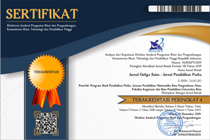DEVELOPMENT OF TEST INSTRUMENTS BASED ON SCIENCE LITERATION IN ENERGY MATERIALS IN LIFE SYSTEM
Abstract
Science literacy is the capacity of individuals to use scientific knowledge to be able to make the right decisions related to nature and human interaction. This study aims to produce test instruments based on scientific literacy on energy matter in living systems. The research method used is Research and Development (R & D) using the ADDIE (Analysis-Design-Development-Implemtation-Evaluation) development model. The stages of the study began with an analysis of the problems of science literacy skills of Indonesian students, then proceeded to develop indicators of questions based on the PISA 2015 indicators. After the indicators were developed, they were followed by making questions and question validation by 3 expert validators. Questions that have been validity tested are limited to 31 students. Data obtained from logical validity and limited trials. Then the data is analyzed descriptively. The results of the analysis of the data obtained are, the validation assessment of science literacy-based test instruments on energy material in living systems by experts is 79.39% with valid validity levels, while the assessment of limited trials is obtained from the validity of 17 questions declared valid and have value reliability of 0.6 with moderate reliability.
Keywords
Full Text:
PDFReferences
Danny Ramadhan & Wasis, 2013. Analisis Perbandingan Level Kognitif Dan Keterampilan Proses Sains dalam Standar Isi (SI), soal Ujian Nasional (UN), soal (Trends in International Mathematics and Science Study (TIMSS), dan soal Prog-ramme for International Student Assess-ment (PISA). Jurnal Inovasi Pendidikan Fisika. Vol. 02 No. 01 Tahun 2013, hlm. 20 -25.
Gormally, C., Brickman, P. & Lutz, M., 2012. Developing a Test of Scientific Literacy Skills (TOLS): Measuring Undergraduates Evaluatio of Scientific Information Arguments. CBE-Life Science Education. 11, hlm. 364-377.
Jack Holbrook & Miia Rannikmae, 2009. The Meaning of Scientific Literacy. Inter-national Journal of Environmental & Science Education, Vol. 4, No. 3 hlm. 275-278.
Kemendikbud, 2014. Paparan Wakil Menteri Pendidikan dan Kebudayaan RI Bidang Pendidikan pada Konsep dan Implemen-tasi Kurikulum 2013. (Online), https://www.kemdikbud.go.id/kemdikbud/dokumen/Paparan/Paparan%20Wamendik.pdf (diakses: 2 Januari 2019).
Kemendikbud, 2016. Peringkat dan Capaian PISA Indonesia Mengalami Peningkatan. (Online). https://www.kemdikbud.go.id/main/blog/2016/12/peringkat-dan-capaian-pisa-indone sia-mengalami-peningkatan (diakses : 20 Desember 2018).
Kemendikbud, 2017. Pengantar Diskusi Penyu-sun Pedoman dan Materi Gerakan Literasi Nasional untuk Guru. Kemen-dikbud RI, Jakarta.
M. Rusdi, 2018. Penelitian Desain dan Pengembangan Kependidikan. Rajawali Pres, Depok.
OECD, 2016. PISA 2015 Draft Science Frame-work. OECD Publishing, Paris.
Sudaryono, 2018. Metodologi Penelitian. Ceta-kan ke 2, Rajawali Pers, Jakarta.
Sugiyono, 2016. Metode Penelitian Pendidikan. Alfabeta, Bandung.
Suhami Arikunto, 2012. Dasar- Dasar Evaluasi Pendidikan Edisi 2. Bumi Aksara, Jakarta.
UNESCO, 2017. Education for Sustainable Development Goals Learning Objectives. United Nations Educational, Paris.
DOI: http://dx.doi.org/10.31258/jgs.7.1.1-10
Refbacks
- There are currently no refbacks.
Copyright (c) 2019 Nurul Elnica, Yennita Yennita, Muhammad Sahal

This work is licensed under a Creative Commons Attribution 4.0 International License.
Jurnal ini terdaftar dan terindeks pada:
- Crossref
- Google Scholar
- Crossref
- Garuda
- Sinta
- Researchgate
- Dimensions
- Base
- Scilit
- OneSearch
- Road
- CiteFactor
- ResearchBib
- WorldCat



















